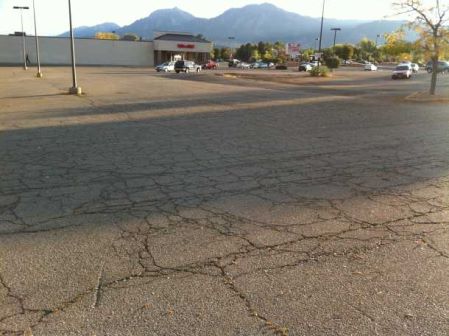A panel of volunteer experts from the Colorado branch of the Urban Land Institute (ULI) reported their impressions of the development prospects of Diagonal Plaza at a public meeting on January 20 and delivered a mixed message about the possibilities. One panelist cautioned that retail stores are growing smaller and commented that Diagonal Plaza lacks the potential to become a regional shopping center. Others, however, reported that King Soopers has indicated a strong interest in building a store ranging in size from 25,000 square feet to 125,000 square feet at Diagonal Plaza and advised that Wal-Mart might be a prime candidate to inaugurate a “green,” socially responsible, multi-use, pilot project there.
The meeting culminated a very quick, eight-hour study of Diagonal Plaza by the ULI panel, which had previously been plied with notebooks filled with information fromcCity staff members about this shopping center in particular and Boulder in general. Six Boulder City Council members and several members of the city’s Planning Board attended the meeting, along with dozens of others.
The panel noted that “parking drives all King Sooper’s stores,” that the grocery chain is not hospitable to structured parking, nor to residential spaces above its stores, but that it had expressed openness to new housing at Diagonal Plaza separated from a new store by a parking lot.
About 15 individuals and companies own property rights at the Diagonal Plaza and to date they have shown little interest as a group in redeveloping the shopping center, or even considering its redevelopment. The ULI panel observed that for any redevelopment to occur, either the owners will have to be motivated and mobilized to take action, or the city will have to intervene by using, or threatening to use, the power of condemnation. The panel recommended that as a preliminary step the city at least collect complete information about all the lease rights, fee interests, and other property rights at Diagonal Plaza.
The panel outlined three development concepts that might be implemented at Diagonal Plaza: “Main Street,” which features strong vehicular-pedestrian corridors; “Paseo,” which features a series of outdoor spaces; and “Community Destination,” which would use rooftops as public spaces and include major attractions, such as a play center.
It also proposed three development approaches: “non-dramatic,” “incremental,” and “dramatic action.” It appeared to favor the incremental approach, which included encouraging the property owners to cooperate in a redevelopment effort, seeking basic agreement between the owners and the city about redevelopment principles, conducting a “void analysis,” rather than a “retail leakage analysis,” and encouraging Boulder Housing Partners (the city’s housing authority), which owns a housing complex next to Diagonal Plaza, to re-do its holding there and perhaps precipitate wider-scale redevelopment. A “void analysis,” panelists explained, determines what significant, retail functions are missing from a community. A “retail leakage analysis,” in contrast, determines what goods and services consumers in a community are going elsewhere to buy.
One panelist advocated redeveloping Diagonal Plaza as part of a larger plan for 28th Street, with 28th Street, 29th Street, and Diagonal Plaza being envisioned as a “dumbbell” shaped district. Others noted that density provides benefits, but also entails extra expenses for parking structures, amenities, etc. “Value-oriented shopping” facilities are unlikely to be able to bear those extra expenses, they warned.
The panel mentioned several incentives that might be needed in order to stimulate redevelopment at the level of quality the city may demand. These included allowing a 55 foot height by right for mixed use projects, allowing heights above 55 feet for some buildings, reducing the 20 percent open space requirement, and reducing parking requirements.
The panel predicted that redevelopment of Diagonal Plaza would take five to ten years and asserted that the pivotal question now is when is the right time to start. It also advised that “Boulder needs to do more work to decide what it does want, not what it doesn‘t want.”




 (1 votes, average: 4.00 out of 5)
(1 votes, average: 4.00 out of 5)